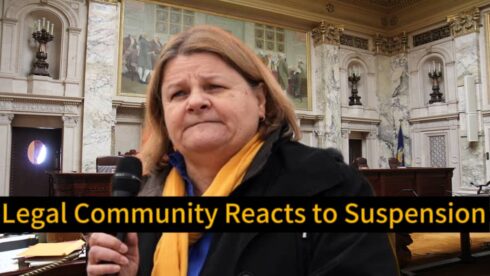Judge Hannah Dugan was suspended from her duties by the Wisconsin Supreme Court on April 29, 2025, after being charged with obstruction of a federal proceeding. The charges stem from an alleged incident in which Dugan assisted an undocumented immigrant in evading arrest by Immigration and Customs Enforcement (ICE) agents at a Milwaukee County courthouse. The court’s decision to suspend her, pending further proceedings, marks a pivotal moment in the ongoing debate over judicial accountability.
Judge Hannah Dugan has denied the allegations, claiming that her actions were intended to protect the due process rights of the defendant. Despite this, the Supreme Court concluded that the suspension was necessary to maintain public trust in Wisconsin’s judicial system during the ongoing legal proceedings.
Details of the Alleged Misconduct Emerge
Judge Hannah Dugan allegedly directed Eduardo Flores-Ruiz, a Mexican national with a history of deportation, through a non-public courthouse exit to avoid ICE arrest. According to an FBI affidavit, Dugan was aware of ICE’s presence and had an off-the-record conversation with the defense attorney to facilitate the defendant’s escape. The court documents suggest that Dugan confronted ICE agents in a bid to prevent their actions.
Judge Dugan’s legal team has disputed these findings, arguing that the judge was simply acting in good faith to ensure a fair hearing and protect Flores-Ruiz’s legal rights. However, prosecutors assert that her actions disrupted a lawful federal procedure, which led to her criminal charges.
Legal Community Reacts to Suspension
Judge Hannah Dugan’s suspension has caused a division in the legal community, with some professionals decrying the swift decision, while others argue it was a necessary step for maintaining judicial integrity. Supporters of Dugan have emphasized her long career of fair judgments and questioned whether her suspension was overly harsh given the nature of the charges.
Judge Dugan’s critics, however, have pointed to the importance of judicial accountability, arguing that any perceived interference with the legal process cannot be tolerated, regardless of a judge’s standing. The case has sparked conversations about the boundaries of judicial discretion and the role of judges in maintaining a neutral stance.
Political and Public Response Intensifies
Judge Hannah Dugan’s suspension has not only sparked legal debates but also ignited political controversy. Republican leaders have called for her immediate resignation and the initiation of impeachment proceedings, accusing her of undermining federal immigration enforcement. Meanwhile, many Democratic figures have expressed support for Dugan, claiming that her actions were a necessary countermeasure against an overreaching federal government.
Judge Dugan’s case has also sparked protests in Milwaukee, where some residents view her suspension as an example of judicial overreach, while others believe it highlights the imbalance in how the legal system handles immigration cases.
Impact on Milwaukee County Court Operations
Judge Hannah Dugan’s suspension will have immediate effects on the operations of the Milwaukee County Circuit Court. The court has announced that a temporary judge will be appointed to oversee Dugan’s caseload, which includes a number of criminal and civil cases. This transition may lead to delays in court proceedings, as well as potential reassignments for some ongoing cases.
Judge Dugan’s absence has raised concerns among legal professionals about the impact of such a high-profile suspension on the local legal system, which is already facing a backlog of cases due to staffing shortages and other issues. The court’s handling of this disruption will be closely scrutinized in the coming months.
Broader Implications for Judicial Independence
Judge Hannah Dugan’s case has brought to light critical questions about the role of judges in relation to federal authority. Legal scholars warn that prosecuting judges for actions taken in the course of their official duties could undermine judicial independence and discourage judicial officers from making decisions based on their interpretation of the law.
Judge Dugan’s case is expected to set a precedent for future cases involving judicial misconduct, and may have broader implications for how judges balance their duties with external pressures, including political and legal forces. The outcome of her legal battle will likely influence how similar cases are handled in the future.














